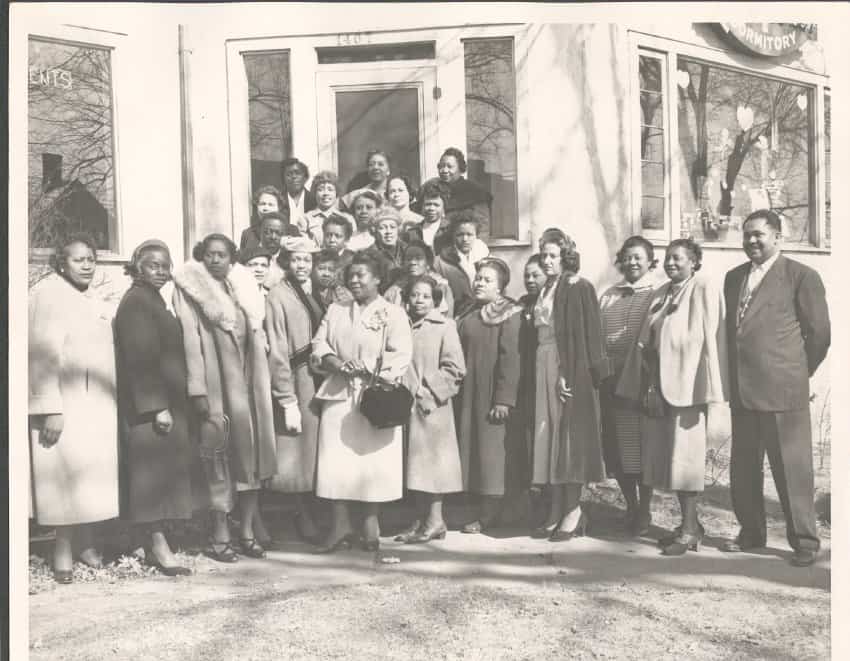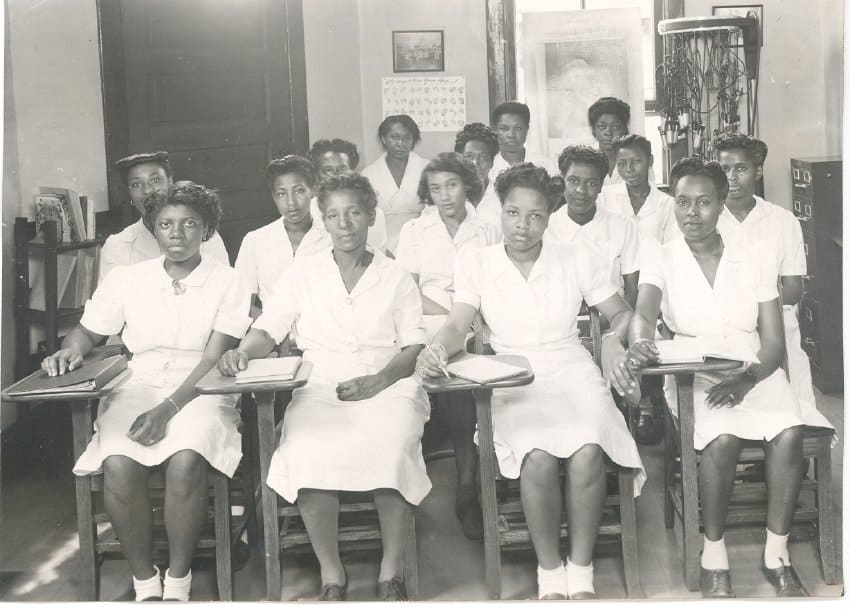This post by IWA Graduate Research Assistant Heather Cooper is the fifth installment in our series highlighting African American history in the Iowa Women’s Archives collections. The series ran weekly during Black History Month, and will continue monthly for the remainder of 2020.
Over the past few months, social media has been filled with people bemoaning the temporary loss of their favorite salon or barbershop and the need to improvise at home for their hair care needs. More broadly, the crisis over Covid-19 has been a reminder of how important local businesses and services are in our daily lives and how much they contribute to our sense of community. This is a good moment to remember and celebrate the history of African American entrepreneurship in Iowa by highlighting the career of Pauline Robinson Brown Humphrey, who might fairly be called the Madame C. J. Walker of Iowa. A life-long resident of Des Moines, Pauline Humphrey opened the first beauty shop for African Americans in Iowa in 1935 and went on to establish the Crescent School of Beauty Culture in 1939. For many years these enterprises operated in the Center Street neighborhood, a thriving black business district in Des Moines.

An oral history with Pauline Humphrey’s daughter Barbara James in the Iowa Women’s Archives recalls the strong example she set for her daughter as a “career woman.” The interview was conducted as part of the Iowa Women’s Archives’ African American Women in Iowa Project in the 1990s.
Denied entrance to cosmetology programs in Iowa on account of her race, Pauline Humphrey traveled to Chicago with her young daughter in order to attend Madame C. J. Walker’s cosmetology school in 1934. There, she worked long hours to study both theory and practice and master how to care for the beauty needs of African American women. When the family returned to Des Moines in 1936, Humphrey passed the State Board of Examination to become a licensed cosmetologist and opened her first beauty shop.
But Humphrey wasn’t satisfied to simply provide services; she wanted to help create opportunities for others to become independent and self-sufficient and she saw a need for a beauty school in Iowa that would accept African American students. Humphrey commuted to Fort Dodge in order to gain certification and become licensed to teach and, in 1939, she opened the Crescent School of Beauty Culture in Des Moines. The school’s motto was “Aim High and Hold Your Aim.”
Around 30 students enrolled at Crescent each semester and trained in all the typical procedures found in African American beauty parlors at the time: “marceling, straightening, bleaching and tinting, permanents, pressing and styling, facials, manicures and pedicures, and cutting and conditioning.” Students learned by doing, offering discounted services for men and women at the beauty shop, as well as making monthly visits to local hospitals where they offered beauty care to patients free of charge. Humphrey sought to increase the availability of black beauty services in Iowa by recruiting students from underserved areas and then sending graduates back home to provide for their own communities. Reflecting on her grandmother’s life work, Julie James wrote that Pauline Humphrey “not only educated students, but did untold service to her community.” Furthermore, the Crescent Beauty School “was a stepping stone for many men and women to gain economic independence” as cosmetologists, stylists, and cosmetology instructors. Humphrey was an advocate for her students, her graduates, and the profession. She went on to lease a chain of beauty shops in the state and start her own line of hair and beauty products for African Americans.
As a female business owner and a woman of color, Humphrey faced many challenges owning and operating her own business. She couldn’t get a small business loan; many people weren’t willing to rent business property to African Americans; and suppliers weren’t always keen on working with a female business owner. Humphrey was also fighting to claim a place in a beauty industry dominated by whites and white standards of beauty. Recalling her mother’s career, Barbara James said, “It was hard for a woman being in that position. . . She fought the racial fights and also the gender fights.” Humphrey built a life around creating opportunities for her daughter to pursue her education through graduate school without financial hindrance and for other men and women to become independent professionals. Citing her mother as the greatest influence in her life, James recalled, “. . .the biggest thing she wanted to do with me was to make sure that I was an independent woman, who could take care of myself, who was educated, and who was able to make a life for myself.” Her mother’s image and her accomplishments provided, for James, the clearest example of how to approach one’s life – “Enjoy it, and savor it, and push yourself to make things better for other people.”
Pauline Humphrey and the Crescent Beauty School are featured in the African American Museum of Iowa’s current temporary exhibit, “Untangling the Roots: The Culture of Black Hair”: https://blackiowa.org/untanglingtheroots/
Material on Pauline Humphrey can be found in the Iowa Women’s Archives collection Giving Voice to their Memories: Oral Histories of African American Women in Iowa. This collection includes an oral history interview with Humphrey’s daughter, Barbara James; a brief remembrance written by Humphrey’s granddaughter, Julie James; and a copy of the article “Iowa Women of Achievement” published in the Iowa State Historical Society’s The Goldfinch: Iowa History for Young People (Winter 1993). Useful information on Crescent Beauty School and other African American businesses in Iowa was also found in Jack Lufkin’s chapter, “‘Higher Expectations for Ourselves’: African-Americans in Iowa’s Business World,” in Outside In: African-American History in Iowa, 1838-2000, ed. Bill Silag et al. (Iowa City: State Historical Society of Iowa, 2001). The photographs are shared by permission of the African American Museum of Iowa, which holds the Humphrey Family papers.

One thought on “Pauline Humphrey & African American Beauty Culture in Iowa”
Comments are closed.